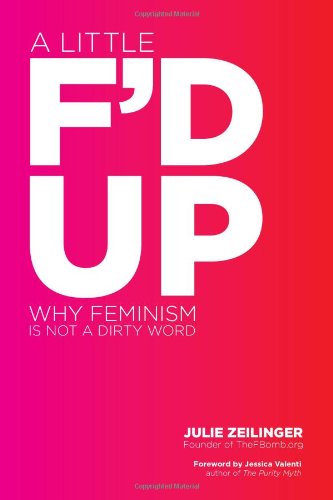 By Vesna Clark – Country to Canberra Teen Blogger
By Vesna Clark – Country to Canberra Teen Blogger
Over the course of my last year of high school, I ordered and collected a large amount of feminist theory, from Mary Wollstonecraft’s, ‘A Vindication of the Rights of Woman (1792)’, arguably the novel to spark the beginning of the First Wave of Feminism, to Naomi Wolf’s, “The Beauty Myth”. However, in such a turbulent time with exams and assessments coming from every direction, many books sat on the shelf untouched. Once the HSC exams finally came to an end I was back into reading, the first one on my list was Julie Zeilinger’s, “A Little F’D UP: Why Feminism is Not a Dirty Word”.
Julie Zeilinger is the founder of TheFBomb.org, a blogging community for young women to express their concerns about gender inequality and to have their voice heard. Zeilinger has been named one of the “Eight most influential bloggers under 21” by Women’s Day Magazine and her writing has been published on a number of platforms.
I’ll start by saying this is not only a fantastic read for anyone who is new to Feminism, but also wonderful for someone who is familiar with feminist theory. I learnt a lot about the history of Feminism and the changing patterns within the various waves. Zeilinger spends roughly 70 pages giving the reader a step by step recount of not only the history of Feminism, but of gender inequality, pointing out where inequality began.
With the rise of religion and a shift in roles due to societal changes, women were no longer just gatherers, equal with their male hunter counterparts but also mothers, housewives and eventually becoming confined within the walls of their own homes, uneducated. She explains the goals of each wave of feminism, from First Wave’s primarily political and basic rights approach, to Third Wave’s goal of abolishing everyday sexism while simultaneously beginning a sexual revolution, acknowledging women’s sexuality.
One of the things I really loved are that there are textboxes scattered throughout the book, providing information concerning significant feminists, feminist causes and defining various terms. Thus, you will not find yourself lost within the pages, but further enlightened with a powerful understanding. Zeilinger takes us through a journey of her own experiences and what she has observed, particularly within her high school years, discussing bullying in a feminist context. She also eliminates myths and stereotypes surrounding Feminism along the way and provides shocking facts such as, “Someone is sexually assaulted every two minutes in the United States”.
Zeilinger not only focuses on women’s issues within the western world, but devotes a whole section of her book to the horrific acts of female genital mutilation, sex trafficking, honour crimes and female feticide and infanticide. Again, she provides the awful reality, “More than 90 million African women and girls are subjected to female circumcision or other forms of genital mutilation”. I found I could relate to Zeilinger more than I could to Germaine Greer or Simone de Beauvior as she grew up in the same world, a part of the same generation. Through the variety of topics spoken about within this book, I believe the main point Zeilinger is making is that Feminism is a multifaceted, evolving movement and the need for it is everywhere, no matter where you live. Violence, oppression and war against women cannot be ignored and I believe by reading this text, you are beginning to educate yourself, inspiring change and action.

